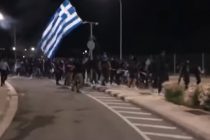A lawyer has criticised the Independent Office for Police Conduct (IOPC) for refusing disciplinary proceedings against a police officer who knelt on a black man’s neck during an arrest in scenes reminiscent of the George Floyd case.
Criminal law specialist Timur Rustem spoke out after the police watchdog decided a misconduct hearing was unnecessary and instead advised the officer to “undertake reflective practice”. He claimed the IOPC’s response to “such a serious case undermines public confidence in the policing.”
Mr Rustem’s client Marcus Coutain, 49, was arrested by police following a fight on Isledon Road in Finsbury Park, North London, around 6.30pm on 16 July 2020.
Video footage posted on social media that evening showed Mr Coutain handcuffed on the pavement with one of the officers kneeling on his neck. Mr Coutain can be heard asking the officer to “get off my neck”.
Metropolitan Police Deputy Commissioner Sir Steve House described the footage as “deeply disturbing” and said some of the techniques, which are “not taught in police training”, caused him “great concern”.
Following the incident, one Met officer was suspended and another was placed on restricted duties.
Mr Coutain was charged with possession of a knife in public, to which he pleaded not guilty. He is due to stand trial at Snaresbrook Crown Court in March 2022.

In February of this year, the Crown Prosecution Service (CPS) said the arresting officer would face no criminal charges. Mr Rustem said at the time that his client intends to appeal against the decision under the CPS’s victims’ right to review scheme.
The IOPC also investigated and issued its findings on 29 July. Its report said there was no evidence Mr Coutain had been treated differently because of his race, and upheld the police’s claim that Mr Coutain had been reasonably stopped because he matched the description of someone suspected of an assault.
While the watchdog agreed the officer may have used unnecessary and excessive force, it did not believe this warranted the need for disciplinary proceedings.
The report instead recommended that the officer should “reflect and learn from the incident to prevent any issues identified from reoccurring”.
According to IOPC guidelines, Reflective Practice Review Process is not a “disciplinary process or a disciplinary outcome”.
The IOPC found the officer should be investigated for a breach of the code of conduct around “authority, respect and courtesy” for the way he spoke to the man and nearby members of the public. It said this could also be dealt with by reflective practice.
Mr Rustem, a criminal defence lawyer with over 25 years experience, disagreed with the verdict. He said on Thursday: “You have a situation where an officer places a knee on a man’s neck during an arrest.
“This is not a technique police are authorised to use, which can lead to injury or death – as seen in America with the case of George Floyd.”
“To allow the police to take a reflective period over such a serious case undermines public confidence in the policing,” Mr Rustem added.




